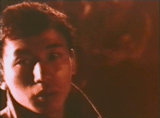It comes as no surprise that the three filmmakers mentioned near the end of Shuji Terayama’s patently offbeat, garish, unclassifiable, and audacious youth culture film, Throw Away Your Books, Rally in the Streets are Roman Polanski, Nagisa Oshima, and Michelangelo Antonioni. Modulating between a psychological study on alienation and disenfranchisement, and a rallying cry for activism and sociopolitical revolution for the late 1960s counter-cultural generation, Terayama’s delirious montage of fragmented, asequential, and imbalanced images reflect the internal chaos and uncertainty of an impoverished – and appropriately nameless – young man and his equally dysfunctional family: an unemployed, peeping tom father, a con artist grandmother, and a sister whose affection for her pet rabbit has turned to bestial obsession. Evoking Polanski’s penchant for the horror of isolation and surfacing violence in the mundane, Oshima’s cultural indictment of postwar recovery Japan, and Antonioni’s moral desolation and ennui, the film’s fractured narrative is interwoven through a series of psychedelic, angst-ridden musical sequences and cited passages, serving as a metaphor for the anarchy, aimlessness, and impotent rage of the marginalized – an impassioned and idiosyncratic approach to independent production filmmaking that thematically (and visually) prefigures the kinetic, hyperstylized films of Fruit Chan. Terayama’s insightful use of bookending sequences presenting the anti-hero’s monologue – first in character as he struggles to validate his identity through delusive examples of self-empowerment, then subsequently as the actor ruminating on the inherent illusion and constructed reality of the filmmaking process – reveal, not simply an anthem for lost, aimless youth in a modern, impersonal world, but rather, a recursive meta-statement on the fabric of human enterprise as transient, escapist, elusive, and insignificant.
© Acquarello 2005. All rights reserved.
